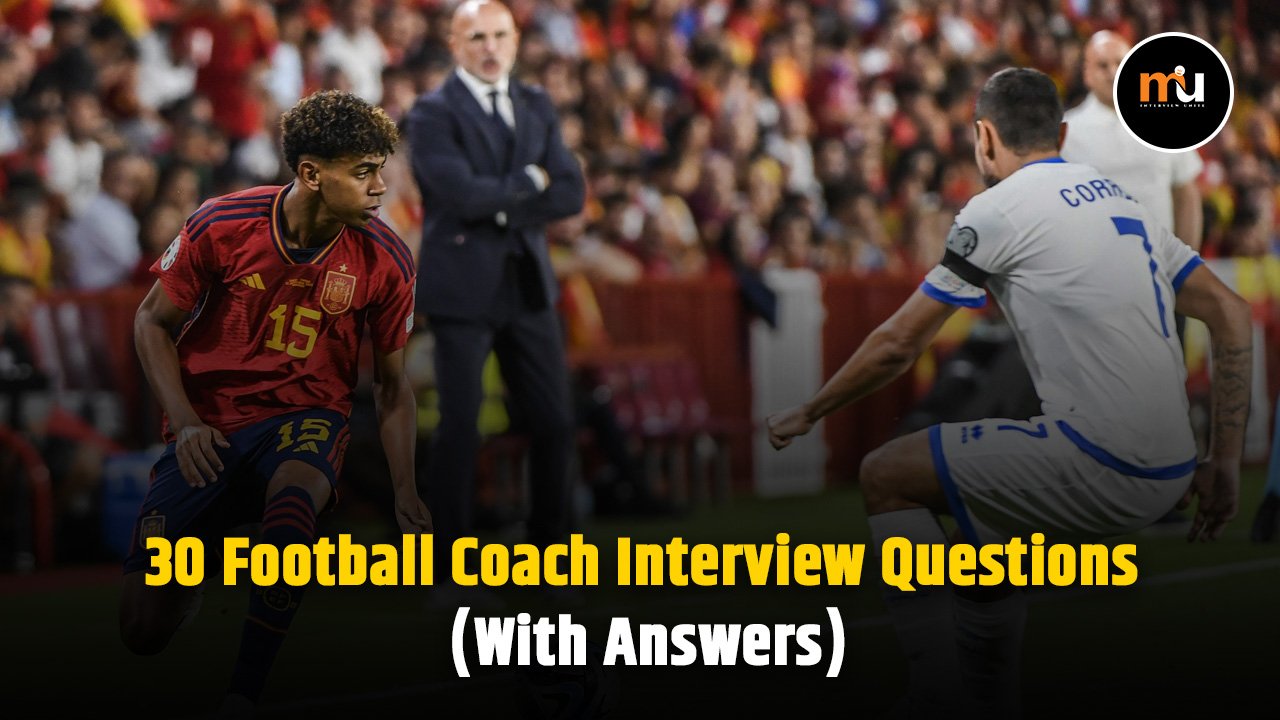If you’re seeking the head coach or assistant coach position Football Coach Interview staff interviews test the ability to lead, strategic skills and the ability to motivate.
Preparedness means anticipating questions about previous coaching experiences and playing philosophies as well as drill preference and the development of players. The ability to prepare responses for common questions demonstrates your ability to align to the requirements of your program.
The list below of Football Coach Interview questions and examples of responses lets you think about your vision, experience and the measurable achievements you’ve made so you can highlight your strengths and demonstrate your ability to improve the performance of your team. If you’re prepared, you’ll be able to effectively communicate your expertise as a coach.
30 Football Coach Interview Questions And Answers
1. What Offensive/Defensive Schemes Or Systems Are You Most Familiar Or Comfortable With?
Example Answer: The most I’ve had is coaching experience in spread offenses as well as bases with a 4-3 defense. But, I’m also able and eager to study and implement any system that is most appropriate for our team and the overall program’s philosophy.
2. How Would You Adapt Your Strategy When Facing Different Opponents?
Example Answer: I take the time to look over each opponent’s tactics patterns, tendencies, and tactics to find areas we can benefit from our game plan. By adjusting our game plan from week to week, we can increase our players’ strengths in different teams.
3. What Are Your Core Values For A Football Program?
Example Answer: I believe that my main values of my program will be the accountability of my team, their resilience, collaboration and putting in a constant effort.
These are the factors that lead to winning attitudes both on as well off of the pitch as well as making players people of character when confronted with challenges.
4. In What Ways Can A Coach Motivate Student Athletes?
Example Answer: Coaches can best inspire players by creating a an overall vision, modeling as well as empowering ownership and leadership opportunities, and facilitating competitions. encouraging growth and acknowledging accomplishments, both small and big.
5. How Do You Evaluate Player Performance And Potential?
Example Answer: In I evaluate players, I go beyond simple statistics to evaluate ability, technique, ability, Football IQ the ability to adapt to coaching, as well as growth potential. These are the most comprehensive assessment of the current abilities and future possibilities for growth.
6. How Would You Work To Improve Student-Athlete Academic Performance?
Example Answer: I require regular attendance at the study hall, provide tutoring, work closely with academic advisors on the course schedules of athletes as well as their grades. I also make tools available to help students achieve a balance between academics and sports. In the end, students have to take responsibility, however I provide them the necessary tools.
7. What Types Of Drills Do You Prioritize In Practice To Develop Your Team? Why?
Example Answer: We concentrate particularly on the fundamental training and agility drills that help build strength, speed and efficacy of movements.
The ability to master these bases translates into success in executing strategies and slaying opponents in the four quarters and overtime if required.
8. How Do You Use Technology Or Data Analytics To Improve Coaching?
Example Answer: Technology offering granular performance metrics analytical analysis for situations, and the ability to track opponents to make extremely informed decisions about schemes, play timing, and matchup benefits. I rely heavily on analytics, but also rely on observations in person to validate its effectiveness.
9. What Experience Do You Have Identifying And Developing Talent Long-Term?
Example Answer: as a university coach I enhanced pipelines for recruiting, securing prospects that were not valued. After arriving on campus, my personal development programs transformed many two-star students into All-conference champions. I create infrastructure for spotting and nurturing talent all year.
10. How Would You Manage Student Athletes’ Parents? What Challenges Might You Anticipate?
Example Answer: Through proactive communication and transparency about team decision-making, I am able to reduce the majority of parent worries.
However, having clear rules and a consistent adherence to guidelines for programs can make it easier to deal with the occasional concerns. I concentrate my discussions on the child’s development.
11. How Do You Foster Positive Team Culture And Chemistry?
Example Answer: The bonds of a team are created by shared goals, accountability of peers and trust-building experiences when faced with adversity as a team and camaraderie-building activities.
Promoting meaningful relationships, focusing on shared vision and in demonstrating vulnerability and support creates the foundations of culture over time.
12. If Named Coach Here, What Would Your Goals Be For Your First Season?
Example Answer: During my first year, fast changes in goals focus on the establishment of unalterable standards and systems that reinforce the culture, work ethic, and discipline.
We can then refine strategies to maximize roster potential during the season. In the long run, my plan is to be a contender for the championship of the conference in just 3 years through accelerating the development of talent.
13. How Do You Manage Losing Streaks While Keeping Players Motivated?
Example Answer: When losing streaks depress morale, I make sure that players to process compound results as they progress by controlling the variables.
We reflect on our preparation shortcomings but we do not dwell on external causes. Maintaining perspective and a progress vision keeps us motivated despite failures.
14. How Do You Manage Assistant Coaches To Function Collaboratively On Staff?
Example Answer: The clear definition of the responsibilities for each position and duties on gamedays ensures the accountability of players, while goal-setting and assessment of strengths that complement each other allows flexible cross-collaboration.
A positive example at the top sets up behaviours that everyone else in the company can imitate.
15. How Do You Utilize Captains Or Player Leadership On The Team?
Example Answer: Captains are the bridge that creates vital communication between coaches and players. I encourage them to hold the players accountable to their standards.
help young talent develop and provide honest team feedback to inform the team’s decisions. This helps develop individual leadership skills as well as enhancing team leadership overall.
16. Describe Your Approach To Play Calling On Game Days.
Example Answer: The risk/reward calling combines aggressive strategies that ride momentum, while also incorporating the game management and clock principles eliminating unnecessary risks from the control point.
However, I would highly suggest captain and coordinator inputs to adjust for real-time feedback changing beyond the guidelines. The constant adaptation keeps the adversaries in the game.
17. How Do You Manage Stress During Intense Game Situations?
Example Answer: Taking strategic timeouts can help remind you to center when stress and emotions are amplified. Between sessions, visualization techniques that focus on controllable execution will remind that the pressures are there to be relieved but resilience and preparedness determine the outcomes that are worth taking.
18. How Do You Establish Trust With Student-Athletes?
Example Answer: Trust is built by showing determination to develop on and off the field. When players understand that they are being guided by a plan that is in their long-term interests They are more likely to accept the coaching plan through successes and failures, while working towards the same goals as a team.
19. Tell Me About A Time You Had To Discipline A Star Player. How Did You Handle This?
Example Answer: Being an individual player who stood out for a game following a string of missed classes messaged to ensure accountability, given their status as a role model. One-on-one,
I assured them of my love for them as a fundamental concern while offering the resources needed to get their academics back on track with accountability. They were able to respond in a mature manner and we proceeded in a constructive manner.
20. How Do You Handle Losing While Keeping Players’ Well-Being The Priority?
Example Answer: Although nobody likes losing, dwelling over it can be toxic quickly. Post-game, I provide constructive feedback on my progress in relation the internal metrics and not on the opponent.
After that, focusing on self-care and rest In addition, I allow players time to relax however they feel best, so that we can get more recent on a set of manageable tasks.
21. How Do You Optimize Nutrition, Injury Mitigation, And Equipment For Player Safety And Sustainability Across Long Seasons?
Example Answer: Sports scientists and specially trained support staff offer incredible assistance in adjusting the gear, fuel and hydration levels as well as to reduce risks during high demands.
The care of athletes’ bodies effectively maintains their abilities to perform at the highest levels while also extending careers that they’ve worked extremely to achieve.
22. Where Do You See Areas For Growth Or Improvement As A Coach?
Example Answer: I understand that how to achieve success faster is by being surrounded by a variety of perspectives. So, I’ll build an assistance team with the capabilities I am lacking naturally.
By doing this I’ll get out of my comfort zone, and better understand how to help the potential of every student-athlete.
23. How Do You Balance Game Preparation With Avoiding Burnout?
Example Answer: Balance between work and life is important to both players and coaches. We incorporate required rest time between sessions for development while keeping track of exercise and markers to assess overtraining.
The bonding of the squad or staff members recharges our mental energy as well. Wellness that is holistic can lead to top performance.
24. How Do You Feel About Conventions Like Post-Game Handshakes?
Example Answer: Rituals that are a sign of sportsmanship that is good reflect the leadership model we establish as leaders is spread throughout communities. When emotions are high maintaining decency and perspectives even when competing with others is a sign of accountability, embracing defeat with maturity and praising wins with humility.
25. How Would You Engage Alumni To Support The Program?
Example Answer: With constant messages, alumni events and coordination of volunteer initiatives I focus on the latest developments in programs that alumni directly contributed to.
This recognition creates an ongoing positive, mutually beneficial relationship that reinforces the pride of school across generations.
26. How Do You Establish Relationships With Parents In A Way That Benefits The Athletes?
Example Answer: During routine checks-ins that go beyond football trends, parents see my true concern for the development of players both physically and mentally.
It also builds confidence that the decisions of coaches remain focused on their child’s progress into a responsible adult despite disappointments that parents may experience.
27. How Would You Manage Student Athletes’ Use Of Social Media?
Example Answer: In being careful not to the temptation to violate the personal liberties of individuals, I instruct players to use their time responsibly and avoid reckless content that can harm the integrity of the team or individual brands.
Appealing to highlight how character displays influence professional careers well beyond the university level create impressions by reframing social media platforms as tools to help.
28. What Experience Do You Have Recruiting Student Athletes? What Makes You Effective?
Example Answer: My familiarity developing local pipelines and maximizing under-the-radar prospects through early, sincere relationship-building pays dividends securing talent and families buying into culture.
The idea of utilizing this with the expanded network as the lead recruiter in this program excites me with the potential to communicate our message in person.
29. What Is Your Philosophy Around Player Availability To Professional Development Opportunities Or Postseason Play If Injured?
Example Answer: Although it is incredibly difficult to inform athletes that they are not contributing to the health of their bodies, taking precautions against any play that could cause exacerbations is a great way to ensure full participation capabilities.
I recommend focusing your energy in limiting recoverables, and let potential future outcomes motivate you to keep going by overcoming perceived obstacles.
30. Do You Have Any Questions For Me About Expectations For This Program Or How The Administration Supports Coaches?
Example Answer: Your most important priorities or areas of concern for the coach who is about to take over take on in their first year?
Are there any projects that the that new staff will be able to be involved in, like facilities expansions? I’d love to hear your views regarding the various culture-related dynamics within the athletic department, and my role in fostering the same.
Football Coach Interview Tips
Research the team/school thoroughly – know their style of play, recent results, roster strengths/weaknesses, school values etc. This demonstrates your dedication.
Prepare a coach’s philosophy with your style of leadership and values, as well as football strategies and training schedules. Be sure to align with the needs of your team.
Review the most common football formations, drills tactics, and more. Be prepared to discuss with them, and think of how to apply these strategies.
Reminisce about your coaching experiences and successes stories. Measure the results. You should have plenty of examples to illustrate your progress in the development of athletes, team-building capabilities and so on.
Be aware of the latest trends and developments that the game is experiencing. Demonstrate how you’ve been able to innovate and adapt as coach.
Develop a vision of your future successes with your program, tempered by the realities of development and progress that is incremental. Don’t over-promise.
Include a portfolio that documents your credentials as well as your Xs and Os knowledge along with sample practice plans as well as your coaching history.
Ask thoughtful questions about assistance from the school and facilities, programs that are not in session accessibility to summer camps and more.
You must ensure that you are able to communicate with interviewers personally. The enthusiasm and the desire to coach and mentorship are crucial.
Final Thought
How to prepare for a football coaching interview involves more than having solid knowledge of X’s and o’s or previous experience. You must demonstrate your leadership abilities and coaching philosophy, as well as developmental plans for player development and your vision of building an elite football program.
This article offers examples of of questions that you’ll get in relation to training, strategy and team culture, among others and allows you to think about your experience and develop effective responses.
As the time for your interview draws near Keep sharpening your understanding of your team and district and preparing your plans to adapt, and working to convey confidence and enthusiasm.
If you show up to the interview in a positive, organized and focused on your team, you’ll be able to demonstrate the passion and determination to lead your team to greater levels of performance. Be true to your values and show the ability to adapt to new settings.
We hope that these tips for interviewing a football coach and questions will prepared you to be successful. We wish you the best of luck as explore this amazing coaching opportunity!
Disclaimer: Information provided in this article is intended as general guidance only. Coaching candidates should conduct independent research on open positions of interest.






